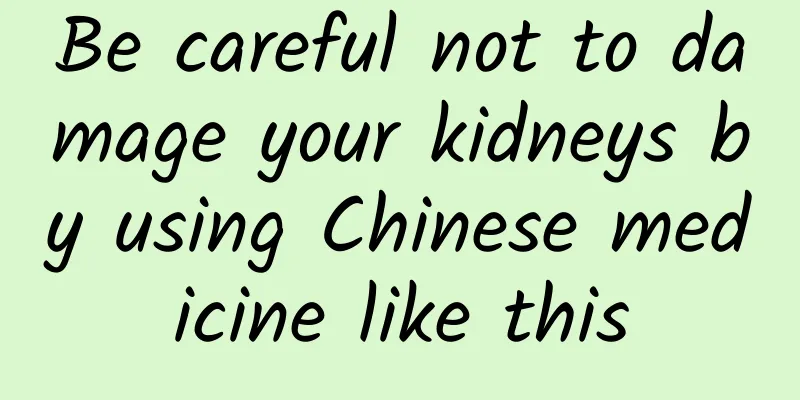Be careful not to damage your kidneys by using Chinese medicine like this

|
Because Western medicine can have side effects, many people prefer to trust Chinese medicine, believing that it is non-toxic, natural and has no side effects. In fact, this is not the case. Abuse of traditional Chinese medicine may cause kidney damage. The following editor will introduce it in detail: Beware! Misuse of Chinese medicine may cause kidney damage The kidneys are responsible for the body's metabolic detoxification. Assuming that a person excretes 1.5 to 2 liters of urine every day, the kidneys actually have to circulate and process 180 liters of primary urine every day, which is about 100 times the former. The metabolism and excretion of drugs also rely on the kidneys, and the molecular weight, lipid solubility, and protein affinity of the drugs will affect renal metabolism and cause accumulation. During the filtering process of the kidneys, once drugs accumulate in the kidneys repeatedly and for a long time, it can easily cause kidney damage. According to statistics, there are three main types of Chinese medicine that may cause kidney damage: The first category is plant-based Chinese medicine, including Tripterygium wilfordii, Aconitum kusnezoffii, Akebia affine, Leonurus japonicus, Xanthium sibiricum, Melia azedarach bark, Radix Trichosanthis, Pharbitis chinensis, Cherry Blossom Root, Fritillaria thunbergii, Bellflower, Nepeta tenuifolia, Croton, Aloe, Maple Seed, Trillium gracile, Datura flower, Ground Wind, Oleander, and Daqing Leaves, Alisma orientalis, Stephania tetrandra, Gelsemium elegans, Senecio grandiflora, clove, Uncaria rhynchophylla, Pulsatilla scabra, Camellia sinensis, Sophora flavescens, Achyranthes bidentata, Diaoyuera japonica seeds, cotton seeds, etc. The second category is animal-based Chinese medicine, including blister beetles, fish gall, sea cucumbers, centipedes, snake venom, etc. The third category is mineral Chinese medicine, which includes arsenic, mercury, lead and other minerals. In the early 1990s, it was popular to use Chinese herbal medicine for weight loss. However, these Chinese herbal medicines contain aristolochic acid. Although it has the effect of removing dampness and clearing heat, this ingredient can damage the renal tubules and cause irreversible kidney damage. Long-term use can develop into uremia. The "cinnabar-boiled pig heart" commonly used by the people contains excessive mercury, and people with liver and kidney dysfunction should not take it. Dioscorea bulbifera is a common "secret recipe" for treating chronic bronchitis, but it contains toxins that affect liver and kidney function and should not be taken for a long time. The Longdan Xiegan Pills, which "caused a big disaster", caused kidney damage in many people who took it because it contained aristolochic acid. The nephrotoxicity of aristolochic acid has been proven. The Ministry of Health has issued a "blacklist" of 12 Chinese herbal medicines containing aristolochic acid that can cause acute kidney injury, including: Longgan Xiedan Pills, Paishi Chongji, Fenqing Zhilin Pills, Fuke Fenqing Pills, Ganlu Xiaodu Dan, Fuqian Zhenzhu Anqiao Pills, etc. Tablets, deafness pills, Danggui Sini Decoction, Xuanzhu Langlu pills, Guanxin Suhe pills, Dieda pills, and Duhuo Jishe Decoction. Other common Chinese medicinal materials containing aristolochic acid include Akebia trifoliata, Stephania tetrandra, Aristolochia lappa, Aristolochia mandshurica, Stephania tetrandra, Aristolochia scabra, and Asarum. Long-term use of medication, large doses of medication and repeated use of medication, especially the abuse of so-called "folk remedies" and "secret recipes" of traditional Chinese medicine, can easily increase the risk of drug-induced kidney damage. Experts remind that patients should take appropriate measures in time when they find kidney damage. For example, fully inform the doctor of the medication history, stop taking the medication immediately, and adopt more active treatment methods. If you must continue to use Chinese medicine, you can also consider reducing the toxicity of Chinese medicine under the guidance of a doctor through methods such as syndrome differentiation, prescription combination, correct preparation, changing the decoction method, and controlling the dosage. |
<<: The man with the best body must be red, bright, thick and soft
>>: Discharge too disgusting? Health status at a glance
Recommend
How to cook braised chicken gizzards
Chicken gizzard is also a part of the chicken. In...
Lumps after DPT vaccine
Children have relatively poor body resistance and...
What are the effects of alfalfa on humans?
Noodles are rich in vitamin A, which can promote ...
The efficacy and function of money lotus
Golden money lotus is also called golden thread o...
What does it mean when there is a line on the belly when you are not pregnant?
We often find a line on the belly, some are obvio...
Is leukoaraiosis dangerous?
White matter is the area inside the brain where n...
Where can I use moxibustion to lose weight?
Obesity is a very difficult gap to overcome for p...
Homemade Kidney-tonifying Paste
Many people with kidney deficiency feel cold limb...
13 exercises to prevent Parkinson's
Parkinson's disease is a type of dementia. Th...
The efficacy, effects and taboos of the yellow grass
As a common Chinese herbal medicine, Ganhuangcao ...
Can I drink milk while taking Chinese medicine? What are the taboos?
There is an old saying that goes, "Medicine ...
Drinking water soaked with euphorbia pulex to treat bad breath
Euphorbia obesa is a common Chinese medicinal pla...
How to remove black spots on teeth
There are many reasons for black spots on teeth, ...
The most disgusting myiasis in history
The following content may make you feel physicall...
Is it better to take donkey-hide gelatin paste before or after meals?
Guyuan paste, also known as donkey-hide gelatin c...









